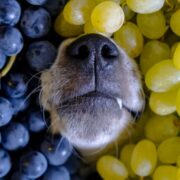Dog owners know all too well that their dog will sometimes eat various forms of plant material, whether it’s your grass, your most prized house plant, or other forms of greenery like leaves.
Many have also noted that dogs vomit frequently after ingesting plant material. This has caused dog parents to believe their dogs are eating the greenery in the first place because they have an upset stomach.
While pet owners and experts alike debate this topic, one thing’s for sure, dogs eating grass and leaves is a frequent occurrence. So why do dogs eat leaves, grass, and other plant material, and should you be worried about it?
Why Dogs Eat Grass, Leaves, and Other Plants
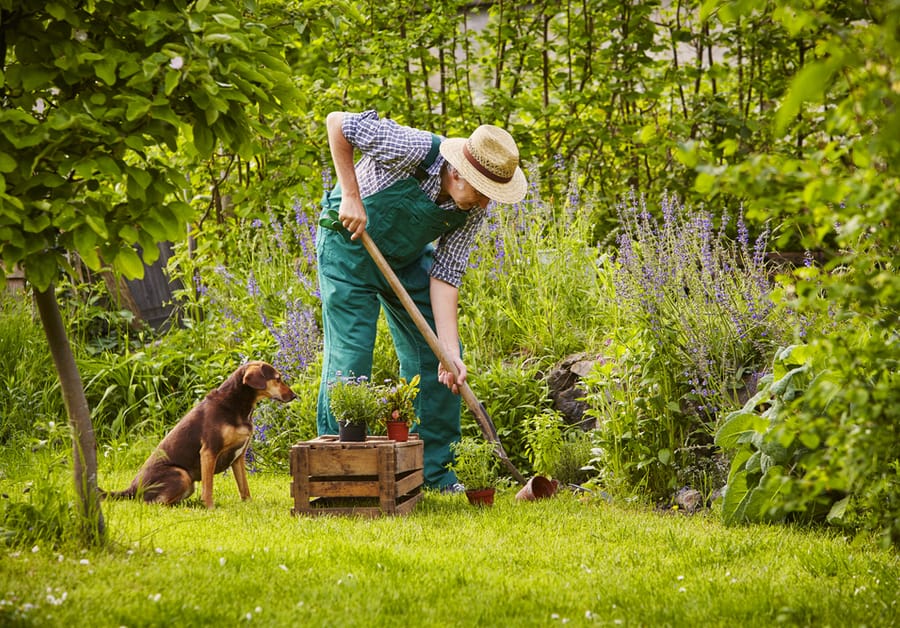
The real answer is that we don’t know for sure why dogs eat grass and other greenery. There are several hypotheses, so let’s look at some of the more popular ideas out there.
Eating Leaves Is an Instinct
We do know that a dog’s digestive system is able to handle plant materials since they are omnivores. That means your dog can eat meat as well as vegetable matter and both are important for meeting his nutritional needs.
Some experts hypothesize that’s why dogs will instinctively seek out greenery to munch on. We do know that wild dogs are also omnivores, and as such, they also eat plant material. So it may be that by eating grass and leaves, your pet dog is simply doing what comes naturally.
Nutritional Deficiency
Many people, including some veterinarians and other animal nutrition experts, think your dog eats leaves or grass because he has a deficiency of some vitamins, minerals, or other nutritionally important foods like roughage. The problem with that idea is that most modern commercial dog foods have a lot of plant materials in them so it shouldn’t be a problem.
As long as your dog’s diet is healthy, it’s unlikely eating leaves or grass is due to any kind of nutritional deficiency. It’s more likely that it represents ingestion of some natural dietary component. In other words, it’s something they instinctively do as part of a natural high-quality diet.
This could become a problem, however, if you’re using commercial dog foods that have low-quality ingredients. Many commercial dog foods contain fillers that have little nutritional value, and if the dog food you’re using has too many fillers and not enough high-quality ingredients, your dog could develop a nutritional deficiency.
How Can I Check My Dog’s Food Quality?
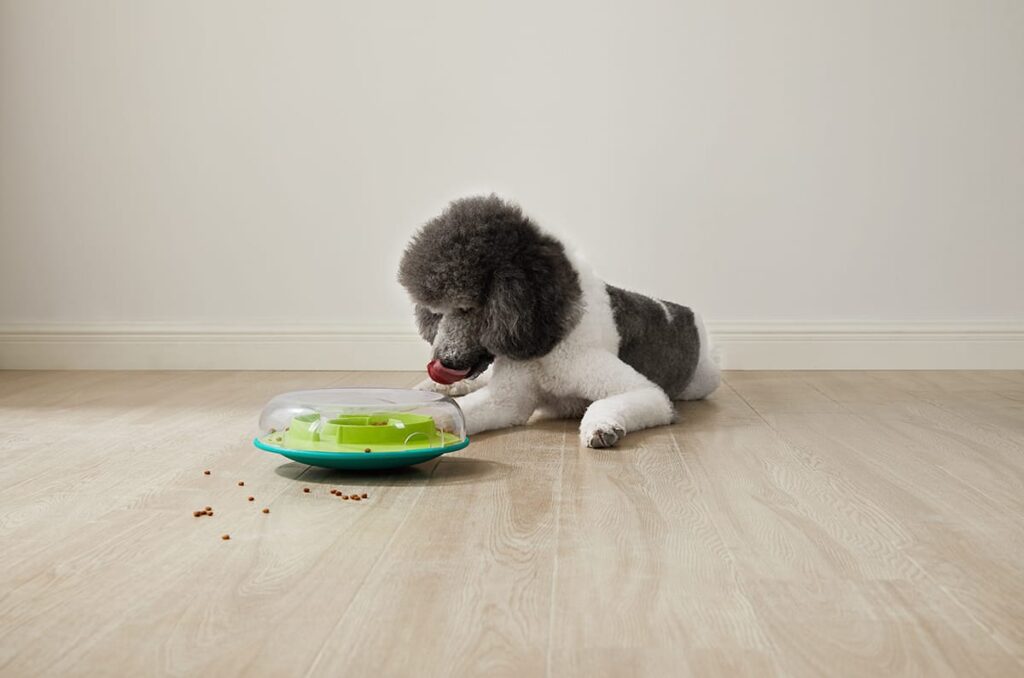
One test a mentor of mine at the Bel-Rea Institute for Animal Technology advised many years ago for hard dog food is simple to do — just put some of your dog’s food in water and let it soak overnight. You can just use a little bit to do this.
In the morning, if you see a lot of feathers and other odd-looking debris floating on top of the water, that indicates a low-quality protein source like chicken feathers and beaks instead of the actual meat.
If this is the case, you might consider changing your dog food brand for something with higher quality protein. You can also speak to your veterinarian about which dog food brands are the best for meeting your dog’s nutritional needs. Once your dog is getting enough high-quality food, there should be no reason for him to turn to eating leaves for additional filler.
Maybe It’s Not Quality, but Quantity?
Another problem dog owners have is if their dog is getting a lot of human snacks and treats, and as a result, he skips his dog food. After all, who doesn’t want to leave room for dessert? If that’s the case, he may be eating leaves or grass as filler or for certain nutritional needs.
As a rule, it’s best to avoid giving your dog human food since your dog’s digestive system can be sensitive to many of the food items humans like to eat. Your pet’s health is important to you, and while you might like to share (and it’s difficult not to give in to those pleading eyes), it’s better for your dog if he sticks to healthy dog treats and food items specifically formulated for his digestive system.
Of course, it’s also important to make sure he’s getting enough food. That varies according to how big your dog is, so it’s best to speak to your DVM to learn more about how much you should be feeding your dog.
Does Your Dog Eat Leaves for the Taste, Texture, or Attention?
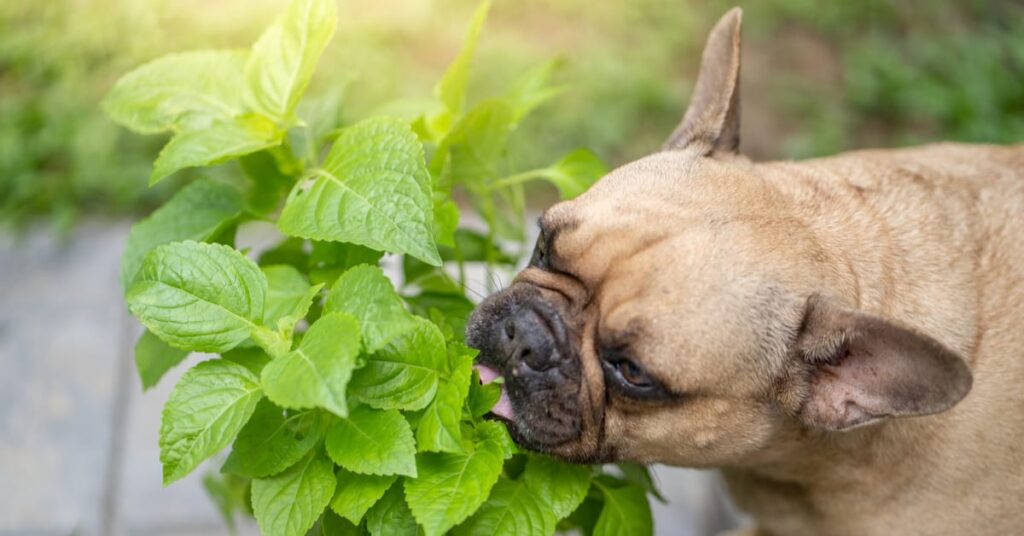
Some people have also proposed that dogs of all kinds gained a taste for plant material when they ingested it in the stomachs of other animals that they ate. You know what they say, “Once you go grass, you never go back!”
Maybe, they just like eating grass and leaves. It could be a texture thing! When you pay more attention to them after they eat leaves or grass, it could also act as positive reinforcement so that they continue doing it for more attention.
Eating Leaves to Induce Vomiting
We do know that the ingestion of grass and other plant materials can make dogs vomit. Of course, pet owners are very concerned when that happens, and it led to the idea that perhaps dogs eat grass and leaves because their stomach is upset and they’re trying to induce vomiting or to otherwise relieve their upset stomach.
The only problem with that idea is it’s like the question about the chicken or the egg and which came first. Did your dog eat the plant material because he had an upset stomach or did eating grass give your dog an upset stomach in the first place? It’s also true that many dogs eat leaves and grass and never vomit.
Is Your Dog Eating Grass and Leaves Because He’s Bored?
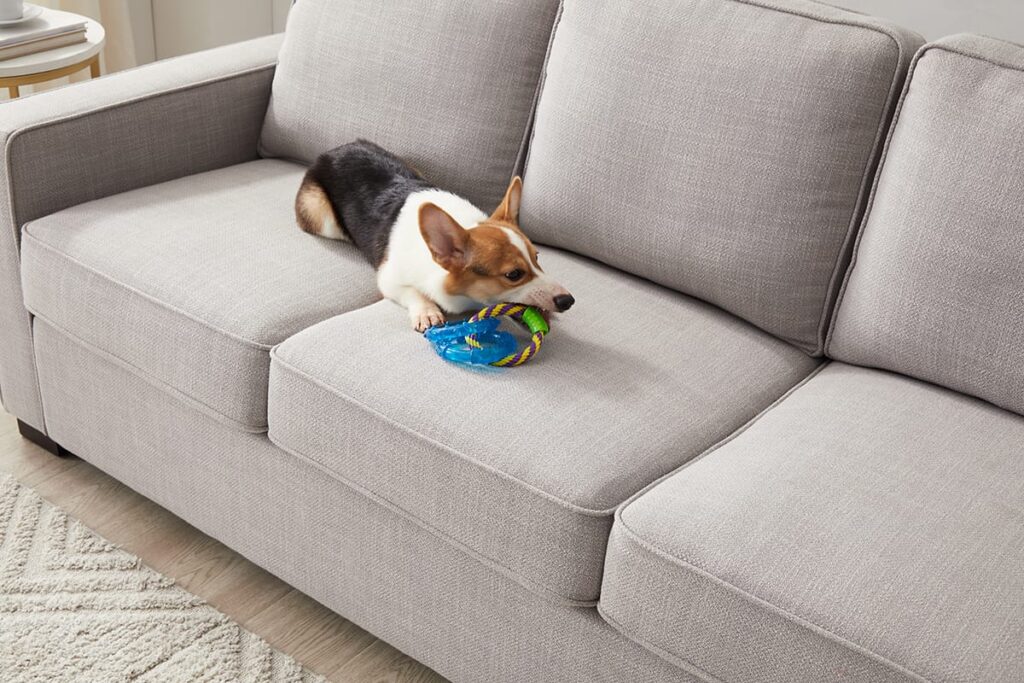
When dogs are bored, they do all kinds of different things to entertain themselves. That could be why your dog chews on the couch, digs holes in the yard, or eats leaves when you leave.
This is why chew toys can be your best friend. They give your dog something better to do with their time than destroy your furniture or eat your plants. It’s especially helpful to have interactive toys that will keep your dog busy for hours at a time.
If those methods fail, however, it may be time for some good old-fashioned dog training. Dog training can actually solve all kinds of behavioral problems. It gives your dog the mental stimulation they need to stay happy and healthy.
Could It Be Intestinal Parasites?
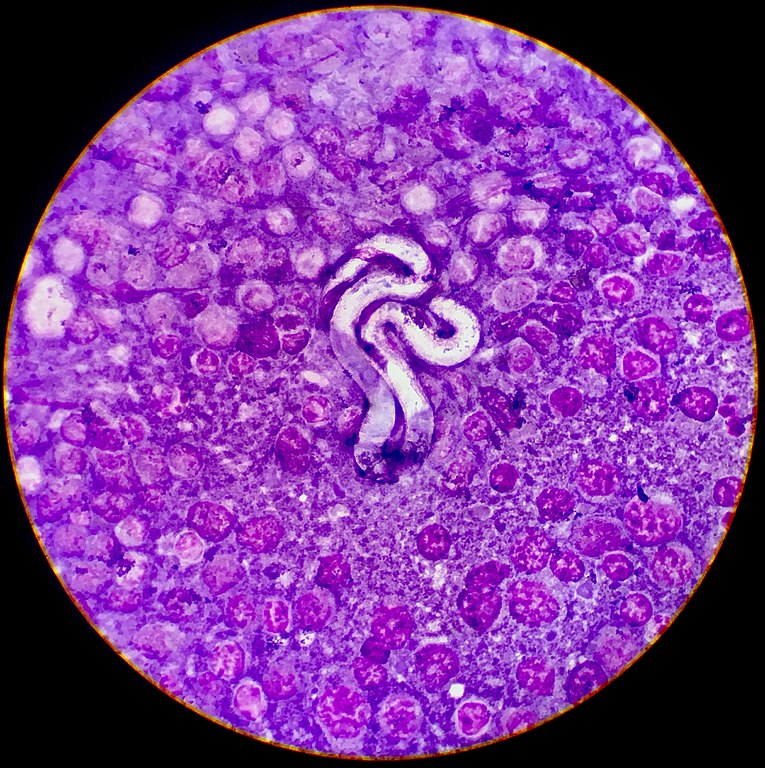
Some people believe that dogs eat leaves as a means to get rid of intestinal parasites. Certainly, intestinal parasites can cause an upset stomach, and perhaps, your dog might eat leaves or grass to alleviate that discomfort as we’ve discussed already.
This is a possibility, but usually, with parasites, you see other symptoms such as diarrhea, actual worms in your dog’s poop or vomit, and bloating or gas. Still, he might be eating leaves because of worms that you might not be able to see.
That’s why if you see him throwing up more frequently than just every once in a while and you notice he has a bloated stomach, it might be a good idea to have your veterinarian check him out. Be sure to take a stool sample so your vet can check for intestinal parasites.
Is Eating Leaves or Grass a Problem?
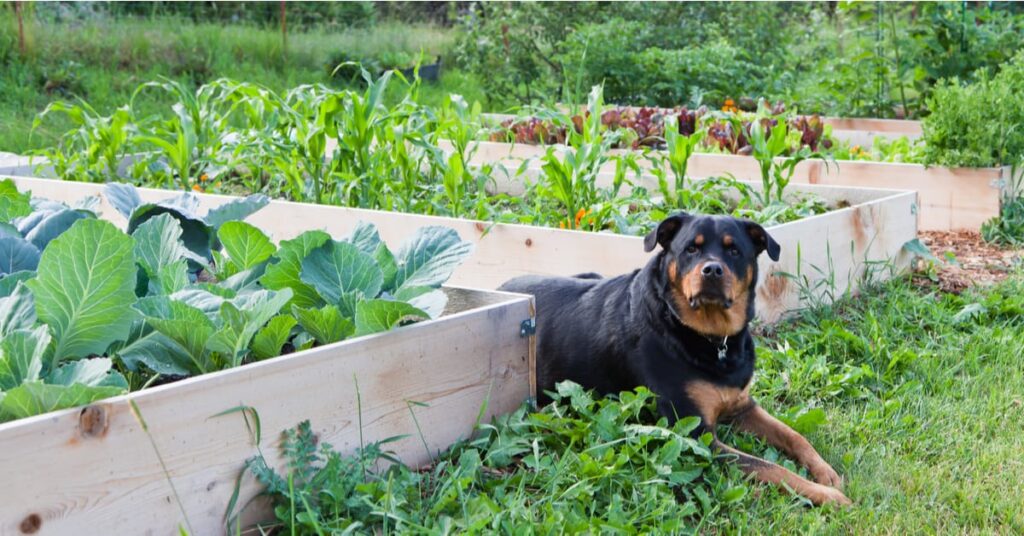
The answer is a definite maybe. It really depends on two things: the reason your dog’s eating leaves or grass and the type of leaves or grass he’s ingesting. As we’ve discussed, there are some health reasons why your dog might be eating grass or leaves, and for those, you want your vet to check him out.
But the type of leaves or grass he’s eating could also cause health problems. For example, if your dog eats grass after you’ve applied pesticides or herbicides to kill certain weeds, that could result in something known as organophosphate poisoning.
If your dog ingests chemicals like that, the first symptom you see is usually excessive drooling. If you know you’ve applied these chemicals to your yard, it’s best to keep your pet away from them until they are absorbed. This kind of toxicity requires emergency treatment, and without it, it can be fatal.
Moreover, there are also many plants that are toxic for your dog. The ASPCA has a list on its website of the plants that are toxic to dogs, cats, and other animals. The list is comprehensive and includes pictures as well as a hotline you can call if your dog has ingested one of these plants.
As with the ingestion of a pesticide or herbicide, if your dog has ingested a toxic plant, you will often see excessive drooling, and that may be followed by vomiting or even seizures. If you think this has happened, call your vet and take your dog in immediately.
Why Is My Dog Eating Leaves? Final Thoughts
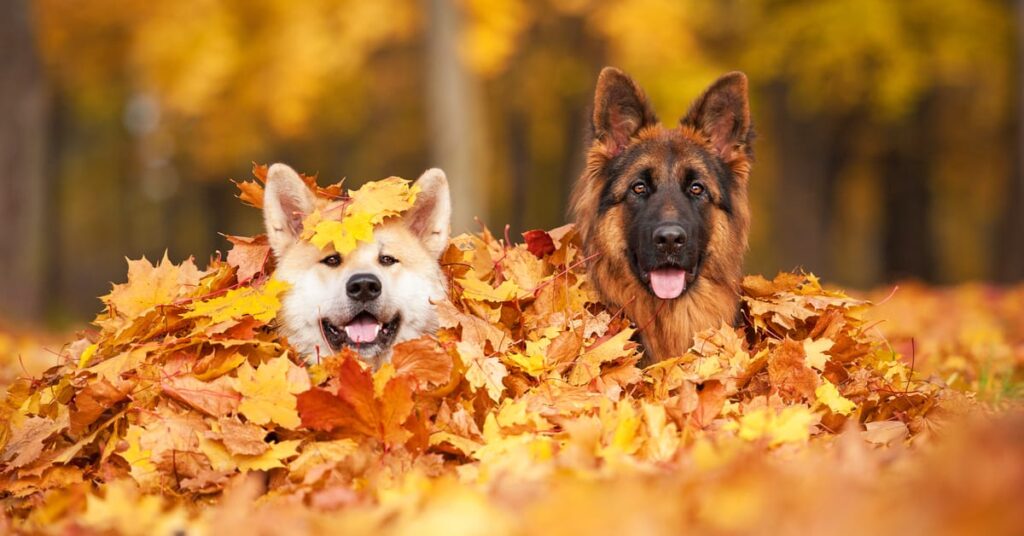
Your pet’s health is important to you, and it can be confusing to see your dog eating something you don’t normally see him eat. Of course, eating grass and leaves is a common behavior for dogs, but why they do it is another matter.
Unfortunately, there are no clear answers as to why your pet eats grass. It is normal behavior, but the best thing to do is make sure your dog’s diet is healthy, that he gets enough food, and that he gets regular checkups for parasites as well as other health issues.
If you do all that, eating leaves and grass is likely something he’s doing out of instinct. It shouldn’t harm him unless he ingests the leaves of a toxic plant or something applied to the plant to promote healthy growth like pesticides. As long as that doesn’t happen, get yourself a salad and have a picnic while you both enjoy your roughage!
